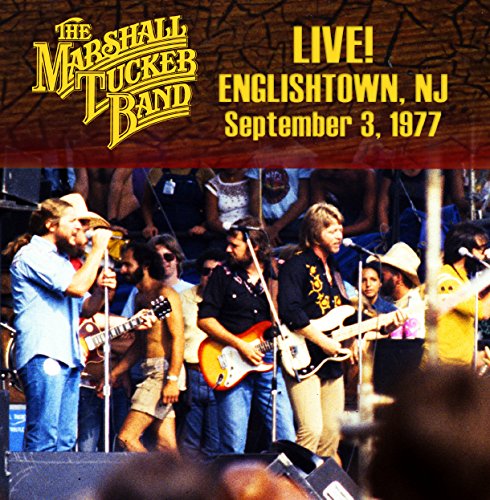
The inescapable conclusion that comes minutes into The Marshall Tucker Band’s Live Englishtown, NJ, September 3, 1977 is how impressive a performance it is despite the quality of the recording, itself. That it survived at all is a worthy positive given the group’s appearance was in advance of headliner Grateful Dead, whose own set is rated by many Deadheads as a favorite, and was only a supportive part of an 11-hour day of music at the central Jersey drag-race track in front of an estimated 150,000. Regardless of any low fidelity regrets, the 70-minute disc offers The Marshall Tucker Band at its apex.
1977 was a banner year for the sextet from South Carolina, its Carolina Dreams release having gone platinum, and four years of touring, playing upwards of 300 dates annually, finding the group peaking as it touched down in Englishtown. Led by the Caldwell brothers, Toy and Tommy, this wasn’t simply a “Southern Rock” band, but an ensemble that swirled dollops of jazz and country swing into the twin-guitar mix separating it from those that had surfaced in the surge following the breakout success of The Allman Brothers Band. It also made for an ideal complement to the Dead’s jug band boogie and ambitious Terrapin Station which had debuted just over a month earlier. This was an audience primed for some serious jamming, and they got it.
Toy Caldwell makes his case throughout as a sadly overlooked guitar master, carrying extended versions of “Never Trust a Stranger” and a sizzling “24 Hours at a Time,” sibling Tommy in symbiotic lockstep on bass at every turn. The hits are here, too, with “Heard it in a Love Song,” “Take the Highway,” and “Can’t You See” feeling celebratory and loose, never obligatory. In fact, the whole set plays like the soundtrack to the party of the summer, eliciting joyous eruptions of whistles and screams that flare into the gaps.
Live Englishtown is The Marshall Tucker Band at a moment representative of its greatness. Such spirited playing and a tangible enthusiasm for the opportunity to perform for a sea of people easily raise this recording above the possible criticisms of its sonic imperfections. What a day in ’77!



No Comments comments associated with this post